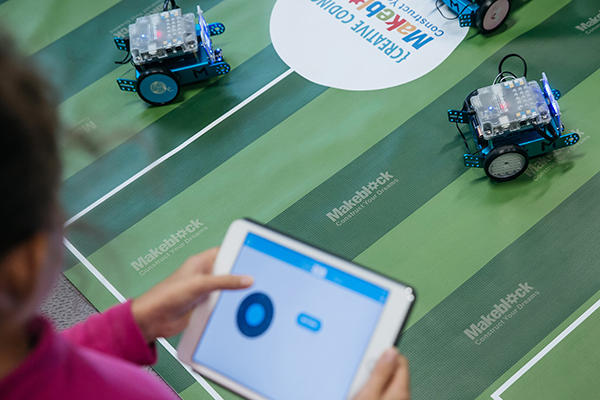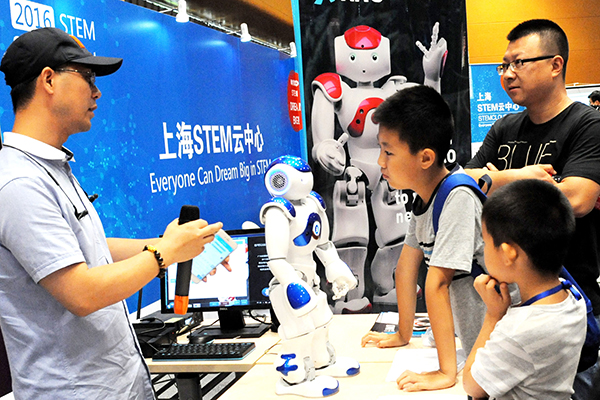Chinese parents mired by hefty costs for tech-focused education
 |
|
A student uses an Apple Inc iPad Mini to control a Makeblock Co mBot robot during a robotics class in Hong Kong. [Photo/Agencies] |
It starts with the idea that children must be trained early to prevail over robots in the workforce. Then it snowballs from there-$3,000 a year for tuition, $350 for a Lego robotics set, and $7,300 to test the newly acquired engineering skills at a competition in the United States.
That's what Zhuo Yu is spending on her 10-year-old son for a so-called STEM education in China-a problem-based approach to learning that combines knowledge in science, technology, engineering, and mathematics.
The concept created in the US is now stirring a craze across China, where about 10 million students are being fast-tracked for STEM success.
That number is poised to swell to 50 million by 2020 as parents seek to give their children a head start in computer coding and robotics, according to consultant JMD Education. It predicts the demand will create a $15 billion STEM-learning industry in China that's already attracted companies such as text-book publisher Pearson Plc, Lego Group, and Sony Corp.
"I don't have a cap on my budget," said Zhuo, who works in the internet industry in the eastern city of Hangzhou. "Yes, I'm investing a lot in his robotics education right now, but you have to take a long-term perspective and look at what opportunities it can bring him after he turns 18."
Her son, Wang Yizhuo, will enter one of the most competitive job markets on the planet after he finishes college. By 2030, China is predicted to have as many as 200 million graduates-more than the entire US workforce. As it is now, 40 percent of tertiary students in China obtain a STEM qualification, compared with less than 20 percent in the US and France.
Future-job angst has helped spawn at least 500 institutions or startups in China offering out-of-school tuition in coding, robotics and 3-D printing, according to Wen Jing, a researcher at Beijing-based JMD Education. It's an industry with little regulation or oversight.
 |
|
Kids and parents interact with a smart robot during the First International STEM Science Festival held in July 2016 in Suzhou, Jiangsu province. [Photo/China Daily] |
That means parents often need to navigate a sea of choices-from legitimate providers to dodgy scammers, said Xiao Dun, co-founder of Beijing-based online education platform 17zuoye.com, which is introducing courses from Minecraft and Sony Global Education in China.
"Even classes that dig worms will tell you it's STEM education because, all of a sudden, it's a biology-related class," Xiao said. "People all think this is the fancy new thing, and there are a lot of rich parents who are eager to spend on their children."
Private education providers are helping to plug gaps in State-provided teaching. The world's second-largest economy lags behind at least 16 countries in Europe and the US in putting coding and robotics on the national school curriculum.
Nora Yeung, founder of Creative Coding in Hong Kong, said coding could become a basic required skill for the future.
"For them to get a job in the future it's almost like any literacy skill or language skill it's going to become a basic need that they need to learn," said Yeung. "We need to prepare these kids for jobs that don't exist yet."
Beijing is testing the benefit of giving parents annual subsidies of about $60 per child to help fund programs to nurture their children's creativity. The money doesn't go far though, as lessons can cost as much as $50 an hour in the national capital, Wen said.
Costs may continue to climb, based on trends in Singapore, where the value of a STEM-focused education has been recognized for years. The city-state this month topped a global education survey by the Organisation for Economic Co-operation and Development on science, reading, maths and collaborative problem-solving.
Ana Ow said she paid about $300 for five robotics lessons for her 8-year-old son-the cheapest tuition she could find in Singapore.
"I count myself as a 'tiger mom' and I have worse ones among my peers," said Ow, who began sending her son to robotics and coding holiday camps three years ago. "I'm very well aware that digital innovation is the new frontier."
The sentiment is shared by parents around the globe. US President Barack Obama pledged $4 billion in January to aid computer science in schools. There were 1.02 million software developer jobs in the US in 2012, according to the Bureau of Labor Statistics, which estimates that number will jump 22 percent by 2022, spurred by "a large increase in the demand for computer software."
Hangzhou mother Zhuo said getting her son to compete in contests has been one of the better ways to evaluate and encourage his learning.
"He showed a real interest in robotics, so we told him, 'why not figure out where you stand via some tournaments?'" said Zhuo, 37. "Because competition comes with pressure, it really forced him to think whether he wanted to devote more time to it."
She had no expectations at the beginning, she said. Her son started putting in hours after school to complete tasks, and became increasingly keen to apply what he learned in class to his robotics projects.
That helped him work better with others, and his team finished fourth in an Intel Corp-backed RoboRave competition, which necessitated a $7,300 trip to the US, Zhuo said. The event that started in 2001 has attracted students from Mexico to Germany to India to participate.
A competitive focus isn't always healthy, cautioned Reynold Ren, who has taught coding to more than 1,400 students in Beijing this year and said he's been approached by some institutions to help them win at all costs.
"This should be all based on interest, not some unhealthy way for students to improve their chances of getting into better schools," said Ren, whose startup is in the process of creating $29 robots to enable more families to buy them for educational purposes.























